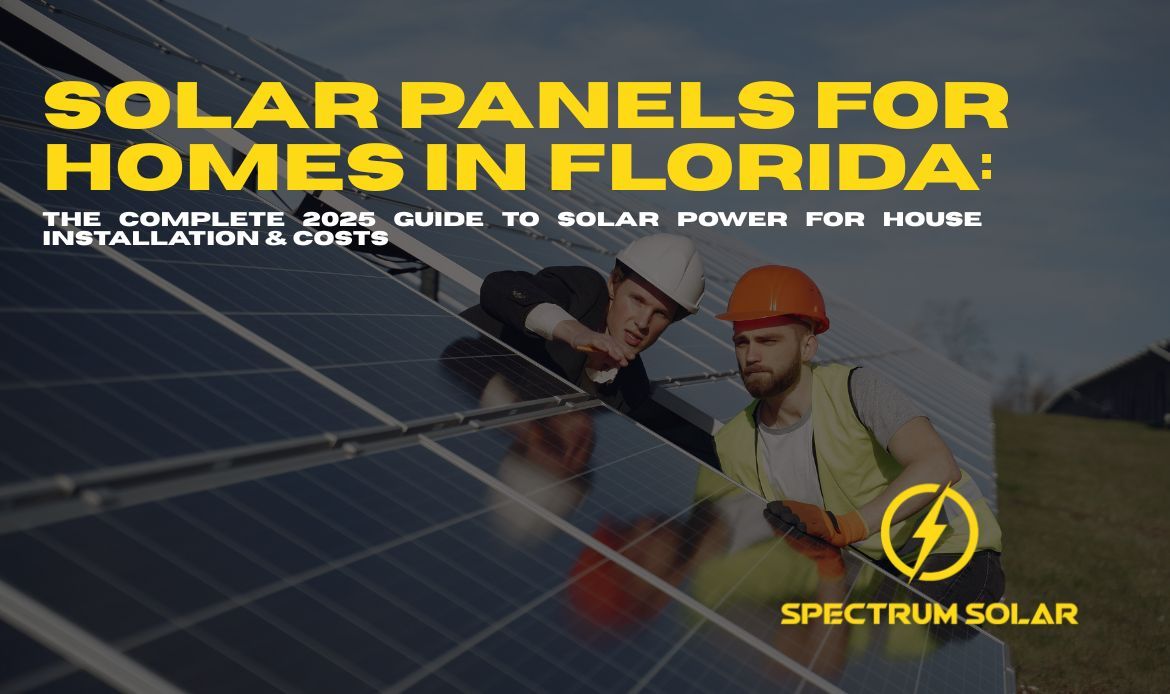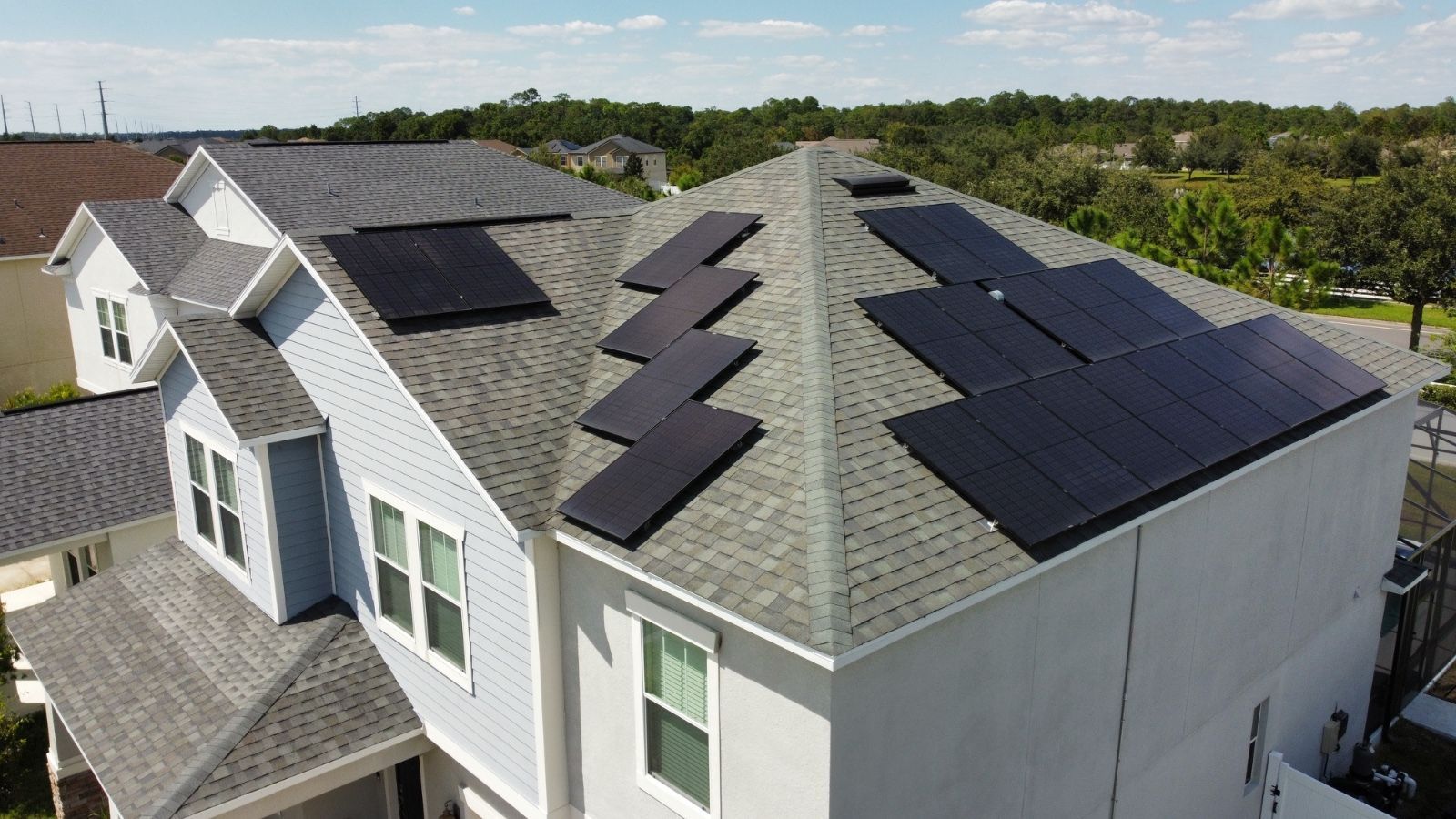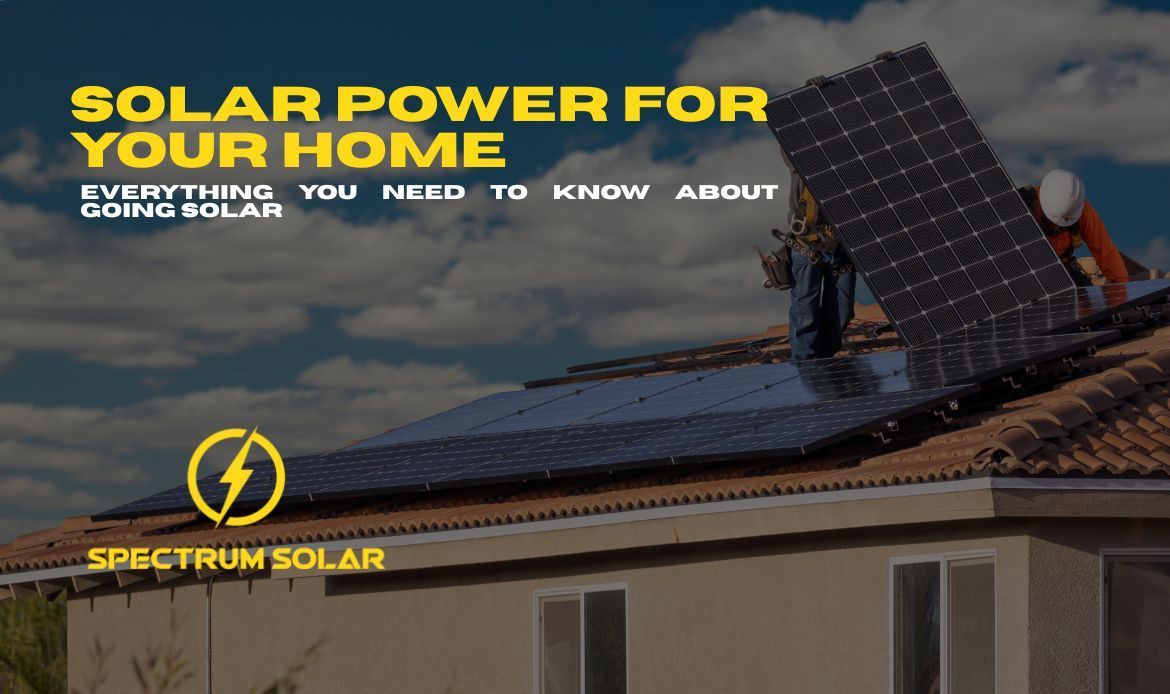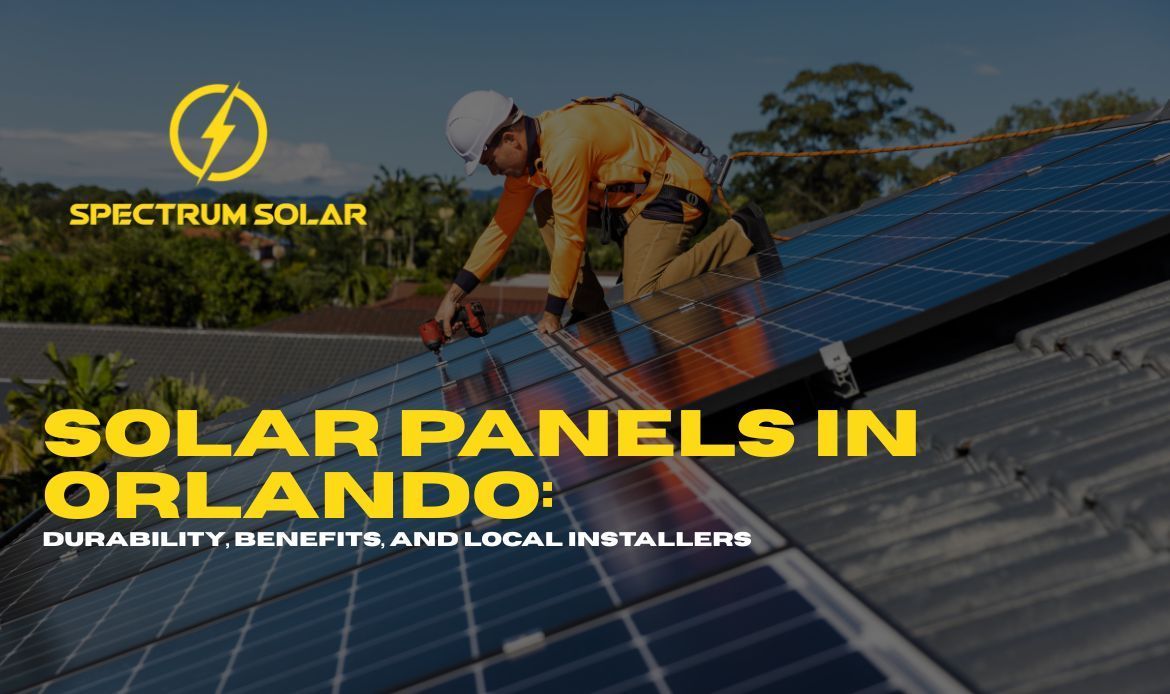Solar Panels for Home in Florida: The Complete 2025 Guide to Solar Power for House Installation & Costs

Why Solar Panels for Your Home in Florida Make Perfect Sense
Solar Power for Home Cost in Florida 2025 & Best Solar Companies for Home Installation
Understanding solar panels for house installation costs helps homeowners make informed decisions. Pricing varies based on system size, equipment quality, and installation complexity.
System SizeCost Before IncentivesCost After 30% Tax CreditMonthly SavingsBest For
4 kW $10,800 $7,560 $85-$120 Small homes
6 kW $15,600 $10,920 $125-$175 Average Florida home
8 kW $20,800 $14,560 $165-$225 Large homes
12 kW $31,200 $21,840 $245-$345 Maximum production
Factors Affecting Solar Energy for Home Pricing
The most significant cost factor is determining the right system size for your energy needs. Florida homes average 1,200 kWh monthly consumption, though this varies based on home size and lifestyle factors.
Panel types significantly impact costs:
Monocrystalline panels:
$2.50-$3.50/watt - highest efficiency, best for limited roof space
Polycrystalline panels:
$2.00-$3.00/watt - budget-friendly option with good performance
Premium brands:
Tesla, SunPower, LG offer extended warranties and higher efficiency
Florida Solar Energy for Home Incentives & Tax Credits Plus Solar Electricity for Home Financing Options
The financial incentives available make solar panels for your home one of the smartest investments homeowners can make. Federal, state, and local programs significantly reduce the effective cost of solar energy for home systems.
Federal and State Solar Incentives
Federal Solar Tax Credit (ITC): The federal Investment Tax Credit provides a 30% tax credit on total solar power for house system cost through 2032, including equipment and installation. This credit has no income limits and unused credits can carry forward to future tax years.
Florida State Benefits:
- Property tax exemption: 100% exemption on solar equipment saves $300-$800 yearly
- Sales tax exemption: No state/local sales tax results in 6-8% immediate savings
- Net metering: Sell excess power back to utilities at retail rates
Example: A $20,000 solar energy for home system costs $14,000 after the federal credit, plus $1,200-$1,600 in sales tax savings.
Solar Power for Home Financing Options
Solar Loans (Most Popular): Solar loans offer ownership benefits while minimizing upfront costs. These specialized loans provide zero down payment for qualified borrowers, competitive rates with 6-20 year terms at 4-8% APR, and monthly payments often lower than current electricity bills. Popular providers include Mosaic, Sunlight Financial, and GoodLeap.
Cash Purchase (Highest Savings): Cash purchasers in Florida typically see 6-9 year payback periods with total 25-year savings ranging from $20,000-$50,000. Benefits include maximum savings, full tax credits, no financing costs, and immediate home value increases.
Solar Leases and PPAs: These options provide no upfront costs but result in lower total savings. Monthly payments are predictable, and professional maintenance is included, making them suitable for homeowners preferring fixed costs over maximum returns.
Solar Generators and Battery Backup Systems for Hurricane-Resistant Solar Power Home Panels
Solar generators and solar batteries have become essential for solar power for home systems in Florida, especially given hurricane season and grid instability. Modern solar installations are specifically engineered to withstand extreme weather conditions, including Category 4 and 5 hurricanes.
Battery Storage Options for Solar Energy for Home
Whole-Home Battery Systems:
- Tesla Powerwall: $11,500-$15,000 installed with smartphone control
- Generac PWRcell: $12,000-$18,000 installed with modular design
- Enphase Encharge: $8,000-$12,000 installed, works with microinverters
Portable Solar Generators:
- Goal Zero Yeti series: $500-$4,000 for reliable portable power
- Jackery Explorer series: $300-$2,500 lightweight emergency use
- EcoFlow Delta series: $800-$3,500 with fast charging capabilities
Battery storage maximizes your solar investment by storing excess daytime production for evening use, provides hurricane preparedness with backup power during outages, enables energy independence from utility companies, and optimizes usage during peak rate periods.
Hurricane Resistance for Solar Panels for Your Home
Florida's building codes require solar panels for house installations to meet stringent standards. All solar paneling must withstand 150+ mph winds with impact-resistant tempered glass construction. Professional installers use penetrating mount systems with secure attachment through roof decking and comprehensive electrical grounding.
Hurricane Ian (2022) provided real-world testing across Southwest Florida. Results showed a 99.9% panel survival rate for properly installed systems, continued power generation with many resuming operation within days, and excellent battery performance maintaining power during extended outages.
Solar Paneling Installation Process and Frequently Asked Questions
The complete process for solar power for home systems typically spans 4-8 weeks from consultation to activation. Professional installation begins with comprehensive home energy audits and custom system design using 3D modeling and production estimates. Installers handle complex permitting including building permits, electrical permits, and utility interconnection agreements.
The actual installation requires 1-3 days depending on system size. Licensed professionals mount racking systems designed for Florida weather, install panels with precise electrical connections, and complete comprehensive system testing. Final municipal and utility inspections ensure safety compliance before system activation.
Common Questions About Solar Power for House Systems
How much can I save with solar panels for home in Florida? Most Florida homeowners save $20,000-$40,000 over 25 years with properly sized systems. Monthly savings typically range from $100-$300 depending on system size and energy usage. Homes with pools or electric vehicles see the greatest benefits.
Do solar panels work during Florida's rainy season? Yes! Solar panels generate electricity from available daylight, not just direct sunlight. Systems typically produce 20-40% of peak output during overcast conditions, and Florida's year-round sunshine ensures consistent production.
How long do solar panels last in Florida? Solar panels carry 25-year performance warranties but typically operate effectively for 30-35+ years. Florida's stable climate actually favors long panel life compared to regions with extreme temperature variations.
What happens during power outages? Standard grid-tied systems shut off during outages for safety. However, solar + battery systems provide backup power through automatic transfer switches, with solar panels recharging batteries during daylight hours.
Ready to start your solar journey? Florida's abundant sunshine, generous incentives, and proven hurricane resistance make solar panels for your home an excellent investment. Contact Us for personalized quotes and take advantage of the 30% federal tax credit while it's available.The financial incentives available make solar panels for your home one of the smartest investments homeowners can make. Federal, state, and local programs significantly reduce the effective cost of solar energy for home systems.
Federal and State Solar Incentives
Federal Solar Tax Credit (ITC): The federal Investment Tax Credit provides a 30% tax credit on total solar power for house system cost through 2032, including equipment and installation. This credit has no income limits and unused credits can carry forward to future tax years.
Florida State Benefits:
- Property tax exemption: 100% exemption on solar equipment saves $300-$800 yearly
- Sales tax exemption: No state/local sales tax results in 6-8% immediate savings
- Net metering: Sell excess power back to utilities at retail rates
Example: A $20,000 solar energy for home system costs $14,000 after the federal credit, plus $1,200-$1,600 in sales tax savings.
Solar Power for Home Financing Options
Solar Loans (Most Popular): Solar loans offer ownership benefits while minimizing upfront costs. These specialized loans provide zero down payment for qualified borrowers, competitive rates with 6-20 year terms at 4-8% APR, and monthly payments often lower than current electricity bills. Popular providers include Mosaic, Sunlight Financial, and GoodLeap.
Cash Purchase (Highest Savings): Cash purchasers in Florida typically see 6-9 year payback periods with total 25-year savings ranging from $20,000-$50,000. Benefits include maximum savings, full tax credits, no financing costs, and immediate home value increases.
Solar Leases and PPAs: These options provide no upfront costs but result in lower total savings. Monthly payments are predictable, and professional maintenance is included, making them suitable for homeowners preferring fixed costs over maximum returns.
Solar Generators and Battery Backup Systems for Hurricane-Resistant Solar Power Home Panels
Solar generators and solar batteries have become essential for solar power for home systems in Florida, especially given hurricane season and grid instability. Modern solar installations are specifically engineered to withstand extreme weather conditions, including Category 4 and 5 hurricanes.
Battery Storage Options for Solar Energy for Home
Whole-Home Battery Systems:
- Tesla Powerwall: $11,500-$15,000 installed with smartphone control
- Generac PWRcell: $12,000-$18,000 installed with modular design
- Enphase Encharge: $8,000-$12,000 installed, works with microinverters
Portable Solar Generators:
- Goal Zero Yeti series: $500-$4,000 for reliable portable power
- Jackery Explorer series: $300-$2,500 lightweight emergency use
- EcoFlow Delta series: $800-$3,500 with fast charging capabilities
Battery storage maximizes your solar investment by storing excess daytime production for evening use, provides hurricane preparedness with backup power during outages, enables energy independence from utility companies, and optimizes usage during peak rate periods.
Hurricane Resistance for Solar Panels for Your Home
Florida's building codes require solar panels for house installations to meet stringent standards. All solar paneling must withstand 150+ mph winds with impact-resistant tempered glass construction. Professional installers use penetrating mount systems with secure attachment through roof decking and comprehensive electrical grounding.
Hurricane Ian (2022) provided real-world testing across Southwest Florida. Results showed a 99.9% panel survival rate for properly installed systems, continued power generation with many resuming operation within days, and excellent battery performance maintaining power during extended outages.
Solar Paneling Installation Process and Frequently Asked Questions
The complete process for solar power for home systems typically spans 4-8 weeks from consultation to activation. Professional installation begins with comprehensive home energy audits and custom system design using 3D modeling and production estimates. Installers handle complex permitting including building permits, electrical permits, and utility interconnection agreements.
The actual installation requires 1-3 days depending on system size. Licensed professionals mount racking systems designed for Florida weather, install panels with precise electrical connections, and complete comprehensive system testing. Final municipal and utility inspections ensure safety compliance before system activation.
Common Questions About Solar Power for House Systems
How much can I save with solar panels for home in Florida? Most Florida homeowners save $20,000-$40,000 over 25 years with properly sized systems. Monthly savings typically range from $100-$300 depending on system size and energy usage. Homes with pools or electric vehicles see the greatest benefits.
Do solar panels work during Florida's rainy season? Yes! Solar panels generate electricity from available daylight, not just direct sunlight. Systems typically produce 20-40% of peak output during overcast conditions, and Florida's year-round sunshine ensures consistent production.
How long do solar panels last in Florida? Solar panels carry 25-year performance warranties but typically operate effectively for 30-35+ years. Florida's stable climate actually favors long panel life compared to regions with extreme temperature variations.
What happens during power outages? Standard grid-tied systems shut off during outages for safety. However, solar + battery systems provide backup power through automatic transfer switches, with solar panels recharging batteries during daylight hours.
Ready to start your solar journey? Florida's abundant sunshine, generous incentives, and proven hurricane resistance make solar panels for your home an excellent investment. Contact licensed installers for personalized quotes and take advantage of the 30% federal tax credit while it's available.
Free Solar Power Savings Estimate
Homepage Free Savings Estimate Form




